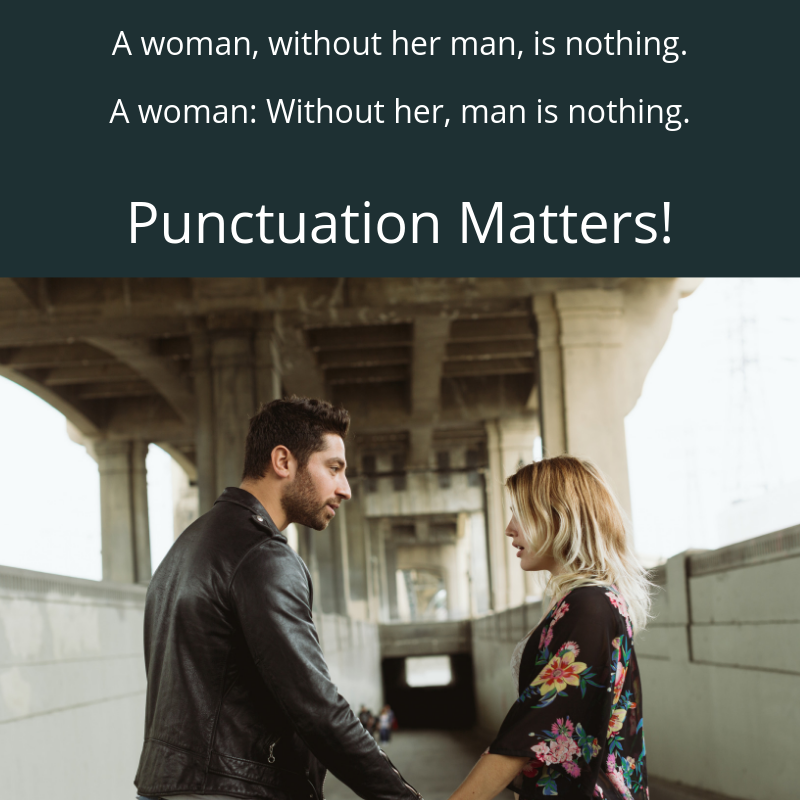|
Clearly, punctuation matters!
It’s not only sentences that are affected by punctuation. History is also affected. Listen to any couple having an argument and you will notice fairly quickly that they spend a good bit of time going over historical events. It doesn’t have to be the distant past. In fact, it’s most often about the recent past…sometimes the very recent past. Here’s an example. Ken: Last night, I was just sitting there enjoying some down time when all of a sudden you started in on me. I didn’t do anything to deserve all that. I was just minding my own business and out of the blue you laid into me. I don’t get it! It’s like you’re looking for ways to make me feel bad. Judy: Out of the blue!? You’ve got to be kidding me! I’d asked you a dozen times over past couple of days to make sure you’d paid the electric bill. What happens? Nothing! And, today we got a shut-off notice. Ken: Well, I asked you yesterday if there was enough money in the checking account to pay the bill. You acted as if you didn’t even hear me. I would have paid it if you had just told me we had the money. What’s interesting about this exchange is that both of them are telling the truth and describing things pretty much exactly as they happened. The problem lies in the way they punctuate history. Judy says the history of this event started days ago when she began asking Ken to pay the bill. Looked at from her perspective, Ken appears to be in the wrong. Ken, on the other hand, says the history of the event started at one of two spots. First, it started when he was relaxing and was attacked for no apparent reason. When that doesn’t work, he suggests a second starting place--when he asked Judy if there was enough money in their checking to pay the bill. Looked at from his perspective, Judy appears to be in the wrong. It’s important to notice two things. First, there is the sequence of events generating the conflict. Second, there’s the effort to assign blame. The effort to assign blame requires each to punctuate the sequence of events in a way that leaves one innocent and the other at fault. If a couple can appreciate the impact of punctuation they might be able to step back and see the bigger picture and therefore resolve things more easily.
0 Comments
There are few decisions weightier than then decision to marry. Though the decision is weighty most people have no real conception of the complexity of marriage. There’s just a lot that goes into putting two lives together particularly if the intention is to remain together until “death does us part.” There are many variations on the marriage theme. Here are two. The first is the traditional perspective. The second takes into account the dynamism most people want to experience in an intimate relationship.
Scene One The big day has arrived. Months of planning and a substantial outlay of resources have gone into the event. Friends and family are gathered. Everyone is all smiles. The bride has walked up the aisle and been greeted by her groom. Vows are exchanged. The couple is pronounced “married.” They then walk back down the aisle and into a beautifully furnished cell. They close the door behind them, lock it and pitch the key out of reach. Everyday thereafter they get up and say, “I love you. I choose you.” In this case, the “I love you” makes sense but the “I choose you” doesn’t because they pitched the key out of reach. The choice each made was a once and done thing. In this scene there is no option for a daily choice. Rather, the couple has opted for the security that comes with removing choice. Scene Two The big day has arrived. Months of planning and a substantial outlay of resources have gone into the event. Friends and family are gathered. Everyone is all smiles. The bride has walked up the aisle and been greeted by her groom. Vows are exchanged. The couple is pronounced “married.” They then walk back down the aisle and into a beautifully furnished cell. They close the door behind them, lock it and each puts a key in his/her pocket. Everyday thereafter they get up and say, “I love you. I choose you.” In this case, both the “I love you” the “I choose you” make sense because the each has access to a key. Here’s the problem… Most of us want to feel secure. We want to know that our lives are built on a firm foundation. At the same time, most of us want to feel loved, desired and chosen…every day. Love, desire and choice can only be fully expressed when we feel free. The confines of a marriage from which there is no exit guarantees security but it eliminates the freedom necessary to express love, desire and choice. By the same token, introducing freedom adds risk to the relationship. How risk is managed determines the level of marital satisfaction. Some couples are willing to give up freedom in order to gain security. Their happiness is rooted in security. Others, prefer the potential for growth that comes with risk. They believe a healthy long-term connection requires fresh air, the right amount of space and clearly marked exits. In the end, couples have to ask themselves, "Will our love and desire grow in the absence of choice? Or, does the fire of love and desire require the oxygen that freedom provides?" It’s their first session of couple therapy. I’ve invited Josh and Sarah to have a seat on the couch. They are obviously anxious, wondering what to expect. After exchanging some pleasantries, Sarah announces, “We just keep having stupid argument after stupid argument. We can’t seem to get out of the loop.”
This is a really familiar start. Thankfully, I’m no longer tempted to ask about the content of their “stupid arguments.” Instead, my first response is to say, “There’s no such thing as a stupid argument. It just doesn’t exist. There are plenty of stupid topics but there’s never a stupid argument.” What I want to convey is that every argument a couple has contains the seeds of what’s really going on between the two of them. Every argument, no matter what the topic, revolves around an important, even essential, issue. Sometimes the arguments are about power or control. Who gets to decide what happens next? Who is in charge? Sometimes they are around concerns one or the other has about the quality of their attachment. Do you really love me? Will you stay with me? Sometimes they are about fear that the other isn’t being open and honest. I don’t know if I can trust what you’re saying. It feels like more is going on than meets the eye. The more a couple focuses their attention on the topic of the argument, the less likely they are to resolve the underlying issue that fuels the argument. Focusing on the topic is often like focusing on the symptom rather than the actual disease. Granted, symptoms can be really compelling. It takes a lot of self-discipline to effectively look past the topic of the argument and attend to the real issue. So… the next time you find yourself in the middle of what feels like a stupid argument, ask yourself, “What’s really going on here? What are the deeper issues we are confronting in the middle of this stupid argument?” |
Jake Thiessen, PhDI've been working with couples for a very long time. And, I love it! This blog is my attempt to communicate some of the things I've learned over the past 40 years. Archives
October 2020
Categories |





 RSS Feed
RSS Feed